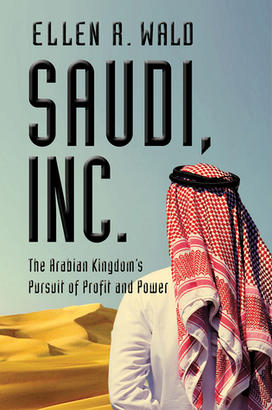Ellen R. Wald ’04 on Saudi Arabia’s Oil-Rich History
The book: A century ago, the land now known as Saudi Arabia was controlled by regional warlords. Now, it is a unified country, a wealthy regional powerhouse, and a major player on the international stage. Ellen R. Wald ’04 profiles the rise of the Arab Nation in Saudi, Inc. (Pegasus Books), focusing on how the country has grown through the shrewd leadership of the al Saud family, and how its rise has been intertwined with the cultivation of a state corporation, Aramco, built on what is possibly the world’s most profitable commodity — oil.
The author: Ellen R. Wald ’04 is a consultant on geopolitics and the global energy industry. She teaches Middle East history and policy at Jacksonville University and contributes weekly columns about the geopolitics and energy policy in several news outlets including Forbes. She lives in Jacksonville, Fla.

A British writer once described Sulaiman as “a frail little man of ‘uncertain’ age but with something of the inspiration of the prophets in his soul.” When the Americans from Standard Oil of California first arrived in Saudi Arabia in 1932, Sulaiman was still “lithe and skinny.” One of the early geologists who came in the 1930s to survey the terrain described the finance minister as a “bright, intelligent, enthusiastic man” who was full of energy and ideas.” The first American ambassador noted that “the Minister of Finance had four [wives], established in a like number of identical adjoining homes where he passed his nights in strict rotation.” As the Americans would discover, however, Sulaiman had a darker side that most often emerged when he drank. Though Islamic law proscribed the whiskey he loved, Abdullah Sulaiman could not seem to put away the bottle. Contemporaries said he would go through periods of sobriety that usually coincided with the month of Ramadan. When abstaining, the Americans observed, he was much more agreeable and even-tempered. Despite this vice, or perhaps because of it, Sulaiman often presented an image of religious devotion in front of foreigners. When meetings with oil company executives would run into one of the five set times for prayer, Sulaiman would always stop the discussion, go to the corner of the room where he would face Mecca and prostrate himself on his prayer rug.
His title of “Sheikh” meant nothing more than a general honorific Arabs had used for centuries to indicate a man of power. As finance minister, Sulaiman exercised complete control over the king’s entire treasury. It was said that “he had his own accounting system that nobody knew how it worked.” Of course, given the state of Arabia in the first decades of the 20th century, the king’s wealth—kept in gold coins, cash, and other precious metals—fit into chests that Sulaiman reportedly stored in his family home. During those lean years, Abdullah Sulaiman’s duties as finance minister mostly involved shaking down Abdul Aziz’s subjects for tax money and collecting tolls from pilgrims on hajj. Once the money came in, Sulaiman’s task was to figure out how to make the money last. In addition to supplying the royal family’s needs, the funds need to be distributed among the king’s subjects in politically expedient ways to ensure continued loyalty from nomadic and settled tribesmen. The degree of loyalty an Arabian king commanded from his subjects depended on his ability to meet their financial needs.
Reviews: “Saudi, Inc. should be mandatory reading for anyone planning to do business in Saudi Arabia… Ellen Wald has done a masterful job of taking you inside the boardrooms and the royal chambers, the competing interests and personalities. She captures the vast scope of history [and] brings alive the interplay among the al Saud family, the tribes, the religious community and culture. Those who may think the Saudis were ill equipped to deal with the modern world are likely to walk away rethinking facile assumptions. Wald chronicles the skill in which the Saudis outmaneuvered everyone, especially the large U.S. corporate enterprises. A necessary read for all those venturing to the Gulf.” —James B. Smith, U.S. Ambassador to Saudi Arabia, 2009-2013
“Well-written and well-researched, Wald’s book is crucial reading for understanding Saudi Arabia… A timely masterpiece.” — Steve Forbes ’70, chairman and editor-in-chief of Forbes












1 Response
Norman Ravitch *62
7 Years AgoWisdom From the Koran
Some uninformed people may think the Saudi elite is backward and unaccustomed to the modern world. But as we got much of our wisdom about human nature from the Bible, the Saudis have gotten it from the Koran. The Koran is an Arabic version of the Old Testament and contains just as much wisdom as the OT, as well as just as much superstition. No reason to think that those for whom the Koran is the guide are any less realistic than those for whom the Bible has served this purpose. After all, both have been written by men -- men of intelligence and insight -- not by any God. We need to take Islam seriously, which only recently is becoming the case.